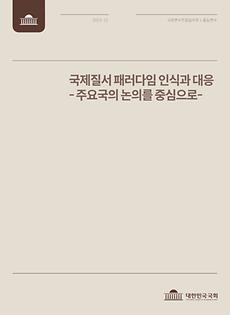
The international order is bound to change and the current global landscape is at an inflection point for change. This report begins by questioning how major countries perceive the changes in the international order, directing attention towards which countries are politically and economically hegemonic and whether liberalism or protectionism prevails as the dominant global order. In addition, it delves into whether the paradigm of the international order will change or whether it is a temporary and partial phenomenon that does not reach the level of paradigm shift. By examining the perspectives of key international actors, this analysis will provide valuable insights for strategizing our response to these global dynamics.
This report begins by embracing the concept of a paradigm in relation to the international order, positioning itself as a "Research Report on the International Order Paradigm Discussions." It attempts to analyze the views of major leaders and governments as well as the viewpoints of academics separately. In particular, to grasp the perceptions of governments and major leaders, we referenced official sources such as foreign strategy documents, white papers, foreign ministry announcements, and statements by major leaders. Nonetheless, in instances where it proved challenging to differentiate between the stances of leaders and academics, our analysis mainly focused on the "international order paradigm perception and response" of the top leaders. The report is organized as follows: an introduction, discussion of the international order paradigm within various countries, characteristics and issues of the discussion, and a conclusion. In the section on countries' discussions on the international order paradigm, the main subjects of analysis are the United States, China, Europe, Japan, and North Korea.
Should this report achieve its objective of encapsulating the perspectives of major nations on the international order and formulating suitable responses for Korea, it will prove to be an invaluable resource for legislators in their policy-making process. Our aspiration is for this report to act as a reference, delineating the stances of key countries on the evolving international landscape, marked by heightened U.S.-China tensions, yet punctuated by signs of cooperation between the two powers.
* This study was conducted with National Assembly Research Service as the National Assembly Collaborative research.